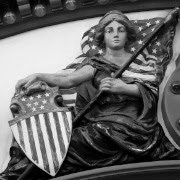Following are quotes from some of the best writing I have seen over the past eight years, on the subject of the 9/11 attacks and their legacy. (I’ve also posted my own 9/11 recollections this year — my first time telling this story.)
Debra Burlingame, sister of the pilot of American Flight 77 that was crashed into the Pentagon on 9/11, cautioned us last year not to “misremember”
There is a disturbing phenomenon creeping into the public debate about all things 9/11. Increasingly, Sept. 11 is compared to hurricanes, bridge collapses and other mechanical disasters or criminal acts that result in loss of life, with “body count” being the primary factor that keeps it in the top spot of “worst in the nation’s history.”
Misremembering is as dangerous as forgetting. If we must know one thing, it is that the Sept. 11 attacks were neither a natural disaster, nor the unfortunate result of human error. 9/11 wasn’t the catastrophic equivalent of a 3,000-car pileup.
The attacks were not a random act of violence or insanity. They were a deliberate and brutal act of war committed by religious fanatics engaged in Islamic jihad against the United States, all non-Muslim people and any Muslim who wishes to live in a secular society. Worse, the people who perpetrated the attacks have explicitly told us that they are not done.
Commenting on this year’s designation of September 11th as a “National Day of Service and Remembrance”, Debra responded (hat tip: neo-neocon):
When I first heard about it, I was concerned. I fear, I greatly fear, at some point we’ll transition to turning it into Earth Day where we go and plant trees and the remembrance part will become smaller and smaller and smaller.
Robert Spencer wrote at at Jihad Watch in 2008:
[T]here has still never been a full and comprehensive discussion of the jihad threat in the American public square.
So seven years after the Towers went down and the Pentagon was wounded, the jihadists have every reason to smell victory — not in Iraq, where they are indeed on the run, but in their efforts to cow and intimidate the West into giving up all resistance to Islamization. It’s happening, but no one notices or cares, because it is happening in small steps.
Neo-neocon re-posted an apropos piece from 2006 last year — one that touches, among other matters, on the foresight we wish we’d had in anticipating and guarding against the attacks:
But the clearest foreshadowing of the event that would henceforth be known only by those numbers, “9/11” — as though words were somehow inadequate to describe it — was its most direct predecessor, the 1993 World Trade Center bombing. That earlier attack distinguished itself in audaciousness by being the only large-scale Islamist totalitarian terrorist attack within the boundaries of the United States prior to 9/11.
And it was every bit as serious in intent. The only reason it wasn’t taken as seriously as it should have been was the seemingly Keystone Cops-like incompetence of its perpetrators. They would learn from their errors, and quickly. It would take us longer to learn what we needed to know.
The cruelty and implacability of the Islamic terrorists has made ordinary life seem fragile not in such a way that you appreciate each passing golden moment, but in a way that jolts you awake at night with strangled thoughts of whether everything you know and love will be taken away. But worse is finding that in this situation where, like our grandparents, we do face an obvious, common, and determined enemy, there is such self-loathing amongst our countrymen. When I hear people phoning C-SPAN to explain that 9/11 was an “inside job” by the Bush administration, or that the United States is to blame for “stirring up a hornet’s nest,” when the swarm was already upon us, it seems to me that national unity is impossible. Of all September 11th’s grim legacies, this seems to me the saddest.
In theory, if you’d wanted to construct an enemy least likely to appeal to the progressive Left, wife-beating gay-bashing theocrats would surely be it. But Islamism turned out to be the ne plus ultra of multiculti diversity-celebration — for what more demonstrates the boundlessness of one’s “tolerance” than by tolerating the intolerant.
If 9/11 had really changed us, there’d be a 150-story building on the site of the World Trade Center today. It would have a classical memorial in the plaza with allegorical figures representing Sorrow and Resolve, and a fountain watched over by stern stone eagles. Instead there’s a pit, and arguments over the usual muted dolorous abstraction approved by the National Association of Grief Counselors. The Empire State Building took 18 months to build. During the Depression. We could do that again, but we don’t. And we don’t seem interested in asking why.
On the Hewitt show tonight I started talking about 9/11, and my mouth overran my head, because somewhere down there is a core of anger that hasn’t diminished a joule. This doesn’t mean anything, by itself — anger is an emotion that believes its justification is self-evident by its very existence. Passion is not an argument; rage is not a plan. But as the years go by I find myself as furious now as I was furious then — and no less unmanned by the sight of the planes and the plumes. Once a year I watch the thing I cobbled together from the footage I Tivo’d, and the day is bright and real and true again.
Or not. It’s all so far in the past, isn’t it? The ten-year-old you had to sit down and console and reassure is off to college. The President is retired — seems like he left two years ago. The wars grind on, but as far as the front pages are concerned, they’re like TV shows that lost their popularity but pull enough viewers to avoid cancellation. (The video store doesn’t even carry the DVD of the first two seasons anymore.) We’re used to the hole in the ground where the towers used to be, and if they announced they won’t rebuild, but will pave it over and use it for parking, people would shrug. We haven’t forgotten that the towers fell, but no one remembers what they planned to replace them with. The towers they planned looked empty in the pictures — shiny, contorted, as if twisting away to avoid a blow.
Right after the towers fell, people who’d never liked them as architecture wanted them back just as they were. Get back up in the sky! But it hasn’t happened. Even if they build the replacement towers, there’s still a space in the sky where no one will ever stand again. We could stand there once. That we couldn’t stand there eight years ago was their fault. That we cannot stand there today is ours.
~(Update)~
Some additional quotes that have struck me as relevant (many of them repeated from my Memorial Day 2009 post):
“When I see the city … I feel that if a war came to threaten this, I would like to throw myself into space, over the city, and protect these buildings with my body.” — Ayn Rand, “The Fountainhead”
“Our responsibility is to continue the search for beauty and humanity. That is what survives.” — violinist Isaac Stern, shortly after 9/11
“We shall not fail or falter; we shall not weaken or tire. Neither the sudden shock of battle nor the long-drawn trials of vigilance and exertion will wear us down.” — Sir Winston Churchill
“Let every nation know, whether it wishes us well or ill, that we shall pay any price, bear any burden, meet any hardship, support any friend, oppose any foe, in order to assure the survival and the success of liberty.” — John F. Kennedy
“It is foolish and wrong to mourn the men who died. Rather we should thank God that such men lived.” — General George S. Patton, Jr.
“We sleep soundly in our beds because rough men stand ready in the night to visit violence on those who would do us harm.” — Sir Winston Churchill / George Orwell †
“We fight wars not to have peace, but to have a peace worth having. Slavery is peace. Tyranny is peace. For that matter, genocide is peace when you get right down to it. The historical consequences of a philosophy predicated on the notion of no war at any cost are families flying to the Super Bowl accompanied by three or four trusted slaves and a Europe devoid of a single living Jew.” — Bill Whittle, “History”
“The only thing necessary for the triumph of evil is for good men to do nothing.” — Edmund Burke
“We can’t share the earth with pure evil anymore than we can share the earth with smallpox.” — David Gelernter
“Evil must be confronted in its womb and, if it can’t be done otherwise, then it has to be dealt with by the use of force.” — Vaclav Havel
“The front line now, at this critical time, is in the hearts and minds of our own people. That’s where the real battle is now. That is our weakest point, our breach, our point of failure. We have not made the case to enough people and time is running out.
So maybe now, at this absurd point in this new kind of war, we’re the crack troops, we old and useless pajama patriots reduced to printing up pamphlets to sell war bonds to the weary, to make the case for holding on to an unglamorous, uninspiring, relentless grind because that — not Normandy and Midway — is the face of war in this gilded age of luxury and safety and plenty.” — Bill Whittle, “Deterrence”
† The “rough men stand ready” quote is frequently attributed to both Winston Churchill and George Orwell in various forms. It is a beautifully focused statement, whatever its true origin.
Previous post: My Experience of September 11, 2001





